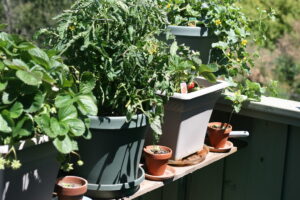Key Takeaways
-
Discover what biochar is and why it’s a game-changer for potting soil.
-
Understand the optimal biochar-to-soil ratios for enhancing plant growth.
-
Learn how to select the best biochar and potting soil combination for your plants.
-
Explore the profound impact of biochar on plant health and vigor.
-
Gain practical tips for integrating biochar into your indoor garden.
Supercharging Your Green Thumb with Biochar
What Is Biochar?
Imagine a material that can hold onto nutrients like a sponge, improve soil structure, and promote robust plant growth. Biochar is just that—a form of charcoal produced from plant waste through a process called pyrolysis, which burns organic materials in a low-oxygen environment. This black gold is not just any old charcoal; it’s packed with properties that can take your gardening efforts to the next level.
Why Biochar Belongs in Your Garden Arsenal
Think of biochar as the unsung hero of the soil world. Its porous nature means it excels at retaining moisture and nutrients, which are then gradually released for your plants to feast on. It’s not just a one-hit wonder either; biochar’s effects are long-lasting, improving soil health for years. And the best part? It’s incredibly sustainable, helping to reduce waste and sequester carbon, making it a win for your garden and the planet.
But that’s not all. Biochar also works wonders in balancing pH levels, hosting beneficial microbes, and even deterring pests. So, whether you’re growing juicy tomatoes or vibrant houseplants, biochar can help you do it more effectively and sustainably.
The Secret to Lush Plants: Biochar’s Potting Soil Perks
Locking in Moisture Like a Pro
One of the biggest challenges in gardening is ensuring your plants get just the right amount of water—not too little, not too much. Biochar’s unique structure allows it to absorb and hold onto water, releasing it slowly over time. This means your plants can access moisture when they need it, which is especially handy during those hot, dry spells.
Boosting Nutrient Uptake
Nutrients are to plants what a well-balanced diet is to us humans—they’re essential for growth and health. Biochar’s high surface area means it can latch onto nutrients and prevent them from washing away. Instead, these nutrients are slowly released, making them available for your plants to absorb when required.
And it’s not just about holding onto nutrients. Biochar also encourages the growth of beneficial microorganisms in the soil. These tiny allies help break down organic matter, making even more nutrients available to your plants. It’s like having an army of microscopic chefs preparing a feast for your garden.
Creating the Perfect Home for Roots
Roots are the foundation of your plants, and they need the right environment to thrive. Biochar creates a soil structure that’s just right—airy enough to allow roots to breathe and grow, yet dense enough to support your plants and prevent them from toppling over. With biochar, you’re building the best possible home for your plant’s roots.
Pairing Biochar with the Right Potting Mix
Best Biochar-to-Soil Ratios for Vigorous Growth
Now, you might be wondering, “How much biochar should I use?” Here’s the scoop: a biochar-to-soil ratio of 10-20% by volume is generally recommended. This isn’t a strict rule—you can adjust the amount based on your plant’s needs and the type of soil you’re using. But starting in this range is a good way to ensure your plants reap the benefits without going overboard.
Here’s how to mix it:
-
Measure out your potting soil.
-
Add 10-20% of that volume in biochar.
-
Mix thoroughly to ensure the biochar is evenly distributed.
Remember, the key is to blend it well. You want every scoop of your potting mix to have its fair share of biochar magic.
Choosing the Ideal Biochar for Your Potting Needs
Not all biochar is created equal. When selecting biochar, consider the source material—it should be clean and free from contaminants. Hardwood-derived biochar is a great all-rounder, but there are also biochars made from bamboo, coconut shells, and other organic materials. Each type has its unique benefits, so choose one that suits your gardening goals.
Most importantly, opt for biochar that’s been pre-charged with nutrients. This means it’s already loaded with goodies for your plants to enjoy from day one. If you can’t find pre-charged biochar, don’t worry—you can charge it yourself by mixing it with compost or a liquid fertilizer before adding it to your potting mix.
With these insights in hand, you’re well on your way to elevating your indoor garden with the transformative power of biochar. Stay tuned for the next part of this guide, where we’ll dive deeper into the impact of biochar on plant health and how to master its use in your green sanctuary.
Witness the Growth: Biochar’s Impact on Plant Health
When you mix biochar into your potting soil, you’re not just giving your plants a temporary boost; you’re setting them up for long-term success. The benefits of biochar extend far beyond the initial planting phase, influencing your plants’ growth and health throughout their lifecycle.
-
Biochar increases water retention, which can be crucial during periods of drought or irregular watering.
-
It enhances nutrient availability, reducing the need for frequent fertilization.
-
Biochar improves soil structure, promoting better root growth and plant stability.
-
The substance helps in the sequestration of carbon, contributing to a healthier environment.
As you integrate biochar into your potting mix, you’ll begin to notice changes in your plants. They may appear more vibrant, grow more vigorously, and even produce more flowers or fruits. This isn’t just a coincidence; it’s the result of biochar’s remarkable ability to create the ideal growing conditions for your plants.
But remember, biochar isn’t a silver bullet. It’s part of a holistic approach to gardening that includes proper watering, lighting, and nutrition. When used in conjunction with these practices, biochar can help your plants reach their full potential.
Now, let’s explore some of the specific ways biochar can enhance plant health.
Faster Growth Rates Unlocked
-
Improved soil aeration from biochar allows roots to access oxygen more efficiently, promoting faster growth.
-
Biochar’s nutrient retention capabilities mean plants have a steady supply of the food they need to grow quickly.
-
The water-holding capacity of biochar ensures plants stay hydrated, which is essential for growth.
When plants have access to the resources they need, they grow. It’s that simple. Biochar acts like a support system, giving your plants a continual supply of what they need to thrive. As a result, you’ll see a noticeable difference in growth rates.
But it’s not just about getting bigger; it’s about growing better. Plants grown with biochar tend to be more robust and healthier overall. So, you’re not just growing plants; you’re growing superplants.
Of course, growth rates will vary depending on the type of plant, the conditions of your garden, and how you care for your plants. But with biochar in your corner, you’re giving your plants the best chance to grow fast and strong.
Robust Root Systems: The Foundation of Plant Health
A plant’s root system is like its foundation—the stronger it is, the healthier the plant will be. Biochar creates a hospitable environment for roots, encouraging them to branch out and establish a firm footing. This leads to better nutrient and water uptake, which is crucial for overall plant health.
Fighting the Good Fight Against Pests and Disease
Healthy plants are better equipped to fend off pests and diseases, and biochar plays a role in building this resilience. By improving soil health and plant vigor, biochar helps create an environment that’s less inviting to pests and diseases. Think of it as boosting your plants’ immune system; when they’re strong, they’re less likely to succumb to invaders.
Observing and Adjusting for Happy Plants
After you’ve potted your plants with the biochar-infused soil, keep an eye on them. You may notice they require watering less frequently, as biochar helps retain moisture. However, be mindful not to neglect watering altogether—biochar isn’t a substitute for regular care.
If you notice your plants aren’t responding as expected, don’t be afraid to adjust your approach. You might need to tweak the amount of biochar in your mix or alter your watering schedule. Gardening is an art and a science, and sometimes it takes a little experimentation to get things just right.
The Right Time to Refresh Biochar in Your Pots
One of the many benefits of biochar is its longevity. Unlike other soil amendments that need to be replenished regularly, biochar lasts for years. However, that doesn’t mean it’s a set-it-and-forget-it solution. Over time, the biochar in your pots will become fully integrated into the soil, and its effects may diminish.
As a general rule of thumb, consider refreshing the biochar in your pots every 4-5 years. This will ensure your plants continue to benefit from its soil-enhancing properties. And because biochar is so stable, you don’t need to worry about it breaking down or leaching away—it’s a long-term investment in the health of your garden.
Boosting Your Indoor Oasis: Tailoring Biochar Use for Specific Plants
Different plants have different needs, and biochar can be customized to suit them. For example, succulents and cacti thrive in well-draining soils, so you might opt for a lighter mix with a lower percentage of biochar. On the other hand, leafy greens and herbs benefit from a nutrient-rich environment, so a higher biochar content might be just the ticket.
Here’s a quick guide to help you tailor biochar use for specific plants:
-
Succulents and Cacti: Mix biochar with a sandy potting mix at a lower ratio, around 5-10%, to improve drainage and mimic their natural habitat.
-
Leafy Greens and Herbs: These plants love nutrients, so go for a higher ratio of biochar, around 15-20%, mixed with a compost-rich potting soil.
By adjusting the biochar content based on the type of plant, you can create the perfect growing conditions for each member of your indoor garden. And that’s the beauty of biochar—it’s versatile enough to benefit a wide range of plants, from the delicate to the hardy.
Embracing biochar in your gardening practice is a step towards a more sustainable and productive indoor oasis. As you watch your plants flourish, you’ll know that you’re not just growing them—you’re nurturing them with one of nature’s most remarkable resources.
Frequently Asked Questions
Can Biochar Be Used with All Types of Indoor Plants?
Absolutely! Biochar is incredibly versatile and can benefit a wide array of indoor plants. Just remember to adjust the amount you use according to the specific needs of each plant species. Some may thrive with more biochar, while others may prefer less.
How Often Should Biochar Be Applied to Potting Soil?
Biochar is a long-lasting amendment, so you don’t need to apply it very often. Once mixed into your potting soil, it can continue to improve soil quality for years. However, if you’re repotting or refreshing your soil, that’s a great time to add a little more biochar to the mix.
Is There a Risk of Overdoing It with Biochar?
While biochar is generally safe for plants, too much of a good thing can be an issue. Using too much biochar can lead to an imbalance in soil moisture and nutrient levels. Stick to the recommended 10-20% ratio to avoid any potential problems.
Does Biochar Change the pH Level of the Soil?
Biochar can have a neutralizing effect on soil pH, which is beneficial in most cases. However, if you have plants that require a specific pH level, like blueberries or azaleas, you’ll want to monitor the soil pH closely and adjust as necessary.
Are There Eco-Friendly Sources of Biochar?
Yes, there are! Look for biochar that’s been produced using sustainable practices, like those made from bamboo, coconut shells, or other renewable plant materials. These eco-friendly options help reduce waste and contribute to a healthier environment.
By now, you should feel confident in using biochar to enhance your potting soil and give your plants a robust foundation for growth. Embrace this ancient yet innovative gardening ally, and watch as your indoor garden transforms into a lush, thriving oasis. With biochar, you’re not just growing plants—you’re cultivating a greener future.



